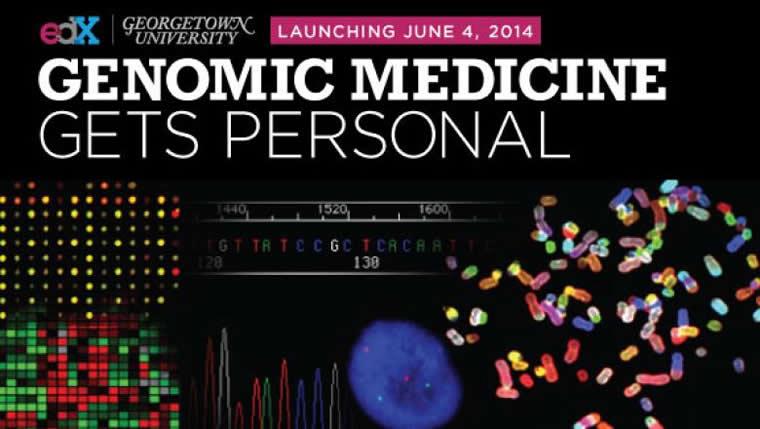Genomic Medicine Gets Personal with New Online Course
Posted in Lombardi Stories | Tagged biomedical education, community outreach, ICBI
(June, 3, 2014) — On June 4, 2014, more than 20,000 people will be introduced to the most personal of medicine — treatment based on an individual’s genome — and all that means for health and society through Georgetown University Medical Center‘s first massive open online course (MOOC).

The eight-session, 16-hour-plus course, called Genomic Medicine Gets Personal, launches June 4.
Unlike a traditional course, participants can absorb the content on their own timeframe — the MOOC is paced weekly but flexible within each week. Presenters are experts in various aspects of genomic medicine, but non-scientists will also take part. For example, in the first session, U.S. Rep. Debbie Wasserman Schultz (D-Fla.) will provide an overview of her experience with breast cancer, a disease that is increasingly understood in terms of tumors’ genetic makeup.
This is the third MOOC Georgetown has offered in partnership with the online learning initiative edX. Last fall, the School of Foreign Service launched Globalization’s Winners and Losers: Challenges for Developed and Developing Countries, and, this spring, the Kennedy Institute of Ethics sponsored Introduction to Bioethics.
All three are funded by Georgetown’s Initiative on Technology-Enhanced Learning (ITEL), an $8-million effort to foster innovative teaching approaches, and produced by Georgetown’s Center for New Designs in Learning and Scholarship (CNDLS) in collaboration with the faculty course teams.
Implications in Every Part of Medicine
This MOOC is designed as a primer on a field that “has implications in each and every part of medicine,” says Bassem Haddad, MD, an associate professor of oncology and obstetrics and gynecology at Georgetown University Medical Center who serves as course director. Haddad also co-directs the School of Medicine‘s molecular and human genetics course.
The subject of genomics is so ripe and fast moving that traditional medical school lectures cannot adequately capture the field’s evolution fast enough, Haddad says.
“Rarely a day passes without news of current or future use of genetics in medicine — how a mutated gene can be targeted to treat cancer, how genomic testing can reveal disease susceptibility, whether genes contribute to brain disorders … and therefore could be prevented or treated,” he says.
Yet the headlines just scratch the surface; beyond fascinating biological complexities, there are intriguing social, ethical and legal concerns.
“Medicine has always been personal, but it gets even more personal when doctors use a person’s genomic information to better understand health,” Haddad says. “The promise of genomic medicine is huge but the social impact of genomic medicine will be equally significant.”
Notable Names
The MOOC’s eight weekly units, which last from one to two-and-a-half hours each, feature notable names such as Eric Green, MD, PhD, director of the National Institutes of Health National Human Genome Research Institute, and Cynthia Morton, PhD, president of the American Society of Human Genetics. An array of Georgetown faculty experts will discuss topics ranging from prenatal diagnosis and genomic screening for disease susceptibility to the use of genomics for personalized treatment of cancer and other medical conditions.
“We are tapping the best there is, including recognized experts at Georgetown, [showing] the depth of our institution’s knowledge in genomics,” says Haddad. “Genomics is a priority for research at the medical center and for teaching at the medical school.”
The MOOC can be audited or taken for certificate credit, and the lectures are supplemented by scientific literature and other databases, Haddad says. The language is geared for laypeople as well as those well-versed in the subject matter, he adds.
Elements of the MOOC can be used to supplement the medical school curriculum, or repurposed for another online medical school course or perhaps as a means for physicians to secure continuing medical education (CME) credits, he says.
A Massive Undertaking
The June 4 launch culminates a year of work for Haddad, the CNDLS team, and many others. Those who have been involved in the three Georgetown MOOCs can attest to just how labor intensive they are to produce, requiring hours of planning, scheduling, filming and re-filming.
The first Georgetown MOOC on globalization required nearly 8,000 “man hours,” says Dedra Demaree, PhD, a CNDLS learning designer and research specialist.
CNDLS is evaluating every element of Georgetown’s MOOCs to determine their effectiveness as a teaching tool.
“Sure it is just a tremendous amount of work, but it beautifully showcases the kind of work that is ongoing on the campuses,” says Janet Russell, PhD, an adjunct professor of human science and director of science programs & technology enhanced learning for CNDLS.
Haddad says that everyone involved with this project demonstrated nothing short of complete engagement.
“This is a novel way of teaching and everyone feels the educational potential,” Haddad says. “Our plan for this MOOC is to make it a ‘living course’ that we will continually update and stay online for a long time to come. It will serve the needs of the public, professionals and our own medical students.”
By Renee Twombly
GUMC Communications
